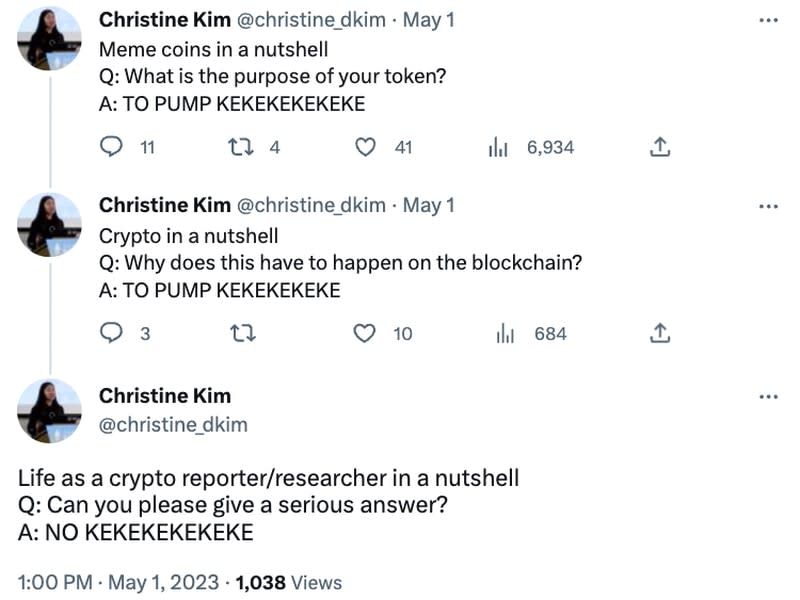CoinDesk wrapped up Consensus 2023 on Friday, marking the end of three days filled with discussions around policy, technology and scams. Catch up on some of the key stories below.
You’re reading State of Crypto, a CoinDesk newsletter looking at the intersection of cryptocurrency and government. Click here to sign up for future editions.
The narrative
There were a lot of policy sessions at Consensus this year, including our first Policy Summit – a full day of discussions centered around regulatory issues around the world.
Why it matters
Thousands of people descended on Austin, Texas last week to talk about crypto. Here’s some of the highlights. That same week, we saw multiple Congressional hearings, follow-up work from the European Union and additional work from regulators trying to grapple with this sector.
Breaking it down
Policy issues had a day in the limelight at Consensus and showed up throughout the week in various talks.
“What’s really fascinating to me about the regulatory conversation is we’re seeing these discussions happen in parallel with ongoing work in Congress and other jurisdictions, lending a bit more urgency to this week’s talks. It has been a very busy week,” I said last week as part of a compilation of views for CoinDesk Chief Content Officer Michael Casey’s Money Reimagined column.
Here’s the thing: I’m biased. I cover policy and regulatory issues both in the U.S. and worldwide as part of my daily job.
What was also really fascinating to me is that my colleagues, who don’t necessarily have to address regulatory issues, also called out regulation as a key topic. Both Nick Baker, CoinDesk’s deputy editor-in-chief and Ben Schiller, CoinDesk’s managing editor for Consensus Magazine, mentioned regulatory issues in the same column. The other contributors included CoinDesk reg team reporters Cheyenne Ligon and Amitoj Singh.
But it is true: the regulatory issues remained front and center in many of the panels last week, including those that in theory were about anything other than regulation. How crypto companies will navigate the various jurisdictions they operate in and how they’ll address concerns from regulators in the wake of last year’s various collapses are both questions we heard during the three days of panels.
There’s also what I’ve taken to calling “fundamental questions.” During a Twitter space discussing Consensus last week, as well as during my opening to the Policy Summit, I mentioned that one of these fundamental questions is “will we ever get a clear delineation between what is a security and what is a commodity.”
It’s a question I asked during some of the sessions I moderated. Of course, this question has an answer if you ask regulators, say at the Securities and Exchange Commission, but mostly I’ve heard it’s a facts-and-circumstances analysis rather than a clear bright line. Will we get that clear bright line?
Another is if we’ll actually see legislation addressing crypto passed in the near future. Congressman Patrick McHenry (R-N.C.), the chair of the powerful House Financial Services Committee, said “yes” when I asked him if a bill might be passed into law within the next year.
Other issues that came up include the upcoming election, which includes the 2024 presidential election. Obviously that’s going to be of interest, but I’m also starting to hear more and more that this may be the first presidential election with an actual crypto component (the Twitter Hack of 2020 doesn’t count).
Read more of the coverage from Consensus at the links below:
-
CoinDesk Winds Down Ethereum Validator ‘Zelda,’ and We Now Wait to Get Money Back: This was a cool experiment by the CoinDesk team, led by former CoinDeskers Christine Kim and William Foxley, and current CoinDesker Spencer Beggs. “Hats off to the entire CoinDesk team for a successful two years of validating. Ethereum’s transition to proof-of-stake is finally complete and Zelda’s purpose to enhance the editorial coverage of that transition has been fulfilled. So proud of this project and the people who carried this project on after I left CoinDesk like Spencer Beggs, Sam Kessler, and Margaux Nijkerk,” Christine said in response to the shutdown.
-
DCG’s CFO Steps Down as Crypto Conglomerate Repays $350M Loan: Digital Currency Group Chief Financial Officer Michael Kraines has left his role after two years, while the company – which is CoinDesk’s parent – announced it repaid a $350 million senior secured term loan and generated $180 million in revenue in the first quarter of this year.
Tuesday
Wednesday
-
(Princeton University) Wow, shocking: “From our qualitative analysis of verified user accounts, we find that cryptocurrency promotion accounts constitute significantly more Blue subscribers than our randomly sampled control dataset, indicating that a significant number of Blue users may be leveraging the confusion between legacy and Blue verification to promote their own commodities.”
-
(Various researchers) Researchers from a number of universities confirm what we all suspected about this year’s bank runs: “social media amplifies these bank run risk factors.”
-
(The New York Times) The FBI searched former FTX Digital Markets CEO Ryan Salame’s house last week.

If you’ve got thoughts or questions on what I should discuss next week or any other feedback you’d like to share, feel free to email me at nik@coindesk.com or find me on Twitter @nikhileshde.
You can also join the group conversation on Telegram.
See ya’ll next week!
Credit: Source link















































